The Joy of Six: sporting heartbreak | Sport
One of the many affirming beauties of sport is its intimacy: we see people live through the most ecstatic and humbling moments of their lives. Yes, they’re looking for fulfillment and validation in all the wrong places, and yes, that’s your super-flying Joy of Six about to volunteer an unsolicited self-help tip, but, although the Awakened Family is immeasurably wise – if you’re a parent or a person, read it – how many titles, belts or majors does Dr. Shefali Tsabary won? Exactly.
That is, while quality time with family and friends is affirming and uplifting, it is also predictable and universal, so unlike a transcendent crescendo that releases the pressures of a lifetime and forever enshrines a person in the annals of humanity. Just ask John White, the journeyman jockey who shot Esha Ness 50-1 at the 1993 Grand National.
The start of the race was delayed when animal rights activists invaded the track, then again when police tape wrapped around various drivers, forcing Keith Brown, who was starting for the last time before retiring, to use his red recall flag to signal a restart. So they hit the road again, only for a second tangle to occur — except this time, Brown’s recall flag didn’t unfurl. Consequently, 30 of 39 runners made their way, with White and Esha Ness taking first place, in the second-fastest time ever.
There’s nothing harder than being a jockey: running hundreds of races a year, wrestling with a gigantic beast, running at frightening speeds, risking death or serious injury, and of course starving yourself in the process. So while we can’t understand for a second how White felt as he celebrated a joy he feared would never come, we can assume that at that moment, a complex and stressful world suddenly became ecstatic and blissful made.
Meager. Very quickly the horrible truth became apparent: the race was null and void, White’s face twisted in horror before covering his eyes, unwilling to believe what he was seeing. “Didn’t you notice that a lot of horses were missing?” Des Lynam wondered afterwards. “Have you ever driven in the National?” came the bitterly grinning reply. “You don’t have time to count horses.”
Undeterred, Des said again, “You finished second in your time, didn’t you?” he asked rhetorically, White nodded in agreement. “Well, you came first this time, but you’re afraid it won’t last, old boy.” “No, I don’t think so,” White replied with calm and devastating understatement. “Bad luck for the owners.”
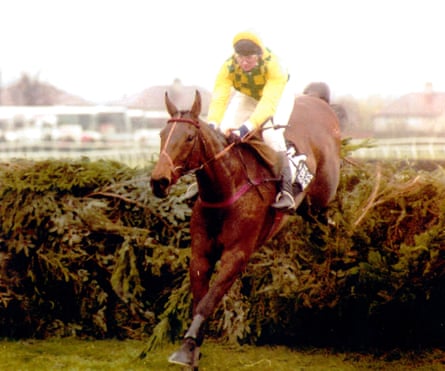
Although every sport inevitably creates a world steeped in adrenaline, ego and chaos, football amplifies these aspects like nothing else. Its rolling, churning nature, coupled with the relative scarcity of its targets, means it can change complexion in shocking ways. But what really elevates things is the way she pursues life and establishes identity. Players compete not just for themselves, but for cities, communities and families who are challenged to demonstrate superhuman feats of skill, endurance and imagination in front of a barking crowd and a worldwide audience.
So it’s no great surprise that the game creates a theme beyond what is usually enjoyed – but even in that context, what happened to Bayern Munich in the 1999 Champions League final was something else. Leading 1-0 against Manchester United in added time, they looked certain of victory as Lothar Matthäus was so confident that he celebrated with the fans while milking his late substitution. But then United equalized and seconds later he scored a winner that not only completed the most confusing ending to a great football game ever, but also the most confusing event most of the 90,000 people on the ground will experience in their lifetime.
This included both groups of players, Bayern staggered and collapsed in shock as if they had been hit by a spaceship full of nasty acid. With bodies scattered everywhere and faces contorted in pain, they tried to process a trauma that will last forever in the moment – with predictable success. So it was up to the referee to wake them up, whether they were slumping against posts or hitting the ground, rousing them from the depths of hell and coaxing them into restarting the few remaining seconds of the game – all while around them their equally hysterical opponents and the vast majority of the crowd cavorted in equal disbelief.
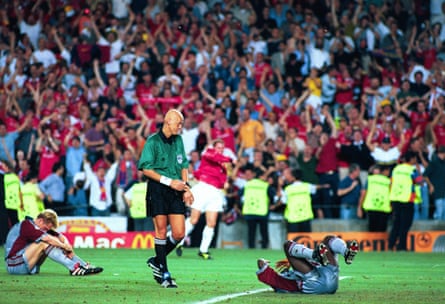
Most sporting heartbreaks happen in the moment: first someone wins, then they lose, and even while that’s in progress you know the victim will never be the same again, their self-esteem drained with regret, their public persona steeped in it. But there are also losses that slowly – if no less profoundly – scald, mocking and tormenting with hope that really isn’t hope at all.
Jimmy White first played at the Crucible in 1981 and he’s still trying, 42-year pro and regularly the oldest competitor in qualifiers. However, he reached six finals in between, and lost them all horribly – an 18-16 loss to Steve Davis in 1984 led to his graduation from Coke to crack.
However, it was in the decade that followed that White truly felt the searing agony of human existence. In 1992 he led Stephen Hendry 14-8, only to miss when he shouldn’t have and lost that frame… and the next nine. But his most devastating loss came in the 1994 final – his fifth spin, four of them against Hendry – when he settled down at the table in a deciding set and looked good, only to miss a black off.
Hendry couldn’t get out of his seat fast enough and duly cleaned up, but White – who was celebrating his birthday for added life-shattering horror – was only 32, giving him plenty of time to make amends. Except that he has not reached another ranking final for six years.
Still, the grim reality may not have dawned until 2015, when Stuart Bingham surprisingly won the world title and, as he celebrated, spied the TV camera White, sat in the front row and applauded with brave generosity. But his face told us everything his hands couldn’t, a generation of delayed despair finally catching up to him. It was over and he knew it.
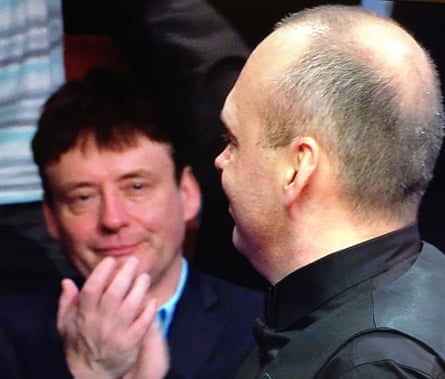
One of the best – and worst – things about individual sports is that it’s all up to the competitor: you win, it’s because of you; you lose it’s because of you Except when not.
At the 2001 Open, Ian Woosnam finished Saturday jointly at the top of the standings and despite falling a shot off pace early in his final round at Royal Lytham, a birdie on the first hole brought him level. It was then that he learned that his bag contained not one but two drivers, earning him 15 racquets instead of the 14 allowed. The penalty for this infraction was two smacks, and a dazed Woosie not only had to accept it, but beat himself to the wits of the authorities – a elation rivaled only by Miles Byrne, the culpable caddy who cheered his boss message had delivered.
Woosnam, then 43, had never won the Open – he had finished third in 1986 and repeated that finish, unable to overcome a mind consumed by anger, nausea and despair. Byrne was generously allowed to remain in office – until he overslept the following month and failed to make the Scandinavian Masters finals – although the error cost Woosnam second place, £220,000 and a chance to take home the Claret Krug. “I just have to win next year, right?” he said afterwards, but he didn’t – and never would.
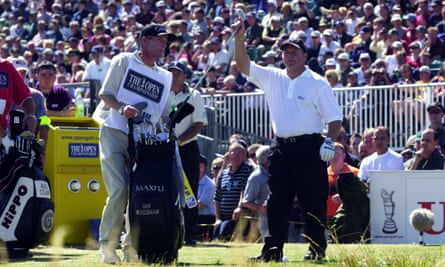
Although the sport is famous for tales of what could have been, tales of what should have been are rare because a largely merit-based system means people generally get what they deserve. But when the greatest tennis players of all time are discussed, Monica Seles is rarely mentioned — for reasons unrelated to her.
There were few phenomena of Seles’ caliber that were so dominant so young. By April 1993, at the age of 19, she and the two-fisted forehand, punished with such joyful aggression, had won three straight French Opens, three straight Australian Opens, two straight US Opens – and her turf game was progressing. The universe was hers.
But then, at a match in Hamburg, someone stabbed her in the back when she changed sides. And while she fought back with characteristic but incredible panache to win another Grand Slam and lose three Major finals, she wasn’t the same player and, more importantly, the same person who spent the next few years of her life with depression and eating disorders. But if you know, you knowledge.
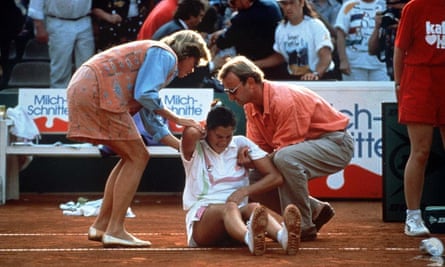
6) sports – all of it
Sport is much more than hitting and kicking balls and faces, it involves family, identity, history and entertainment – aspects of existence that affect everyone. Because of this, its ability to transcend geographic or cultural boundaries and appeal to the entire world population is unrivalled.
Normal people have always known this, as have various despots, but in the last 30 years unsuspecting corporations and human rights-violating plutocrats have also struck. As a result, we can no longer simply enjoy things, but have to engage regularly in remembering how many people have suffered and died for our enjoyment—suffering and dying. And there is little more heartbreaking than that.